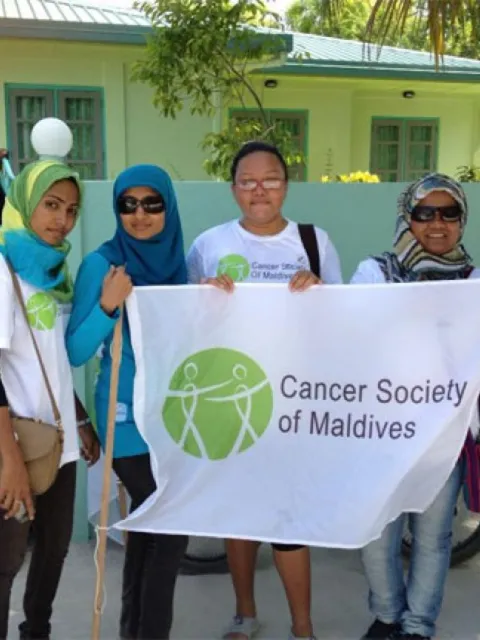Fighting the tobacco epidemic

As far back as I can remember, I always wanted to be a physician. My mother would recall that I used to gather my dolls around me and give them “prescriptions”. I never doubted, as many adolescents do, what my professional career would be. I wanted to be a surgeon. But when I completed my medical degree in 1989, I already had one son and was pregnant with my second child: surgery would have been a difficult option.
I was very lucky, however, to continue working in clinical settings and would do so for almost two decades in Uruguay, my native country.
This was how I began to confront the problem of noncommunicable diseases (NCDs) – cancer, cardiovascular diseases, respiratory diseases and diabetes – especially when working with poor, underserved communities. NCDs claim lives and affect our well-being, but they can be prevented by focusing on a handful of behavioural risk factors. Understanding that NCDs can be prevented and how they can be prevented has driven my work in addressing these risk factors, notably an unhealthy diet, insufficient physical activity, the harmful use of alcohol and tobacco use.
Going from individual to population care
Around 2000, I was working for the Health Department of the Municipality of Montevideo, the capital of Uruguay. Soon I began to represent the department at tobacco control activities and was tasked with establishing and coordinating the municipality’s tobacco cessation clinics. I joined the National Alliance on Tobacco Control and later the Ministry of Health’s Advisory Commission on Tobacco Control, where we supported the enactment of our first tobacco control measures: smoke-free environments and health warnings.
In 2006, I took the difficult decision to leave my country to join the Pan American Health Organization (PAHO) in Washington D.C., working on tobacco control at the regional level. For almost a decade, I worked as a tobacco control adviser supporting countries in the World Health Organization (WHO) Region of the Americas to implement a new international and legally binding treaty, the WHO Framework Convention on Tobacco Control (WHO FCTC), which had entered into force in 2005. During my last four years at PAHO, I was Chief of the Risk Factors and Nutrition Unit in the Department of Noncommunicable Diseases and Mental Health.
Head of the WHO FCTC Secretariat
After 14 years at PAHO, I was ready for a new challenge. I applied and was honoured to be selected as the new Head of the Secretariat of the WHO FCTC, beginning in March 2020.
The Convention Secretariat serves two treaties: the WHO FCTC and the Protocol to Eliminate Illicit Trade in Tobacco Products, a new separate treaty that builds on Article 15 of the WHO FCTC addressing illicit trade in tobacco products.
The WHO FCTC was negotiated under the auspices of WHO and was adopted by the World Health Assembly in 2003. The Protocol was adopted by the Fifth Session of the Conference of the Parties (COP) to the WHO FCTC in 2012 and entered into force in September 2018. The WHO FCTC currently has 182 Parties, while the Protocol has 62 Parties.
The work of the Convention Secretariat includes:
- supporting our governing bodies, the COP for the WHO FCTC and the Meeting of the Parties (MOP) for the Protocol, as well as any subsidiary bodies;
- supporting Parties in implementing the Global Strategy to Accelerate Tobacco Control: Advancing Sustainable Development through the Implementation of the WHO FCTC 2019–2025, adopted by the Eighth Session of the Conference of the Parties;
- providing technical cooperation in other areas requested by Parties; and,
- coordinating with WHO, other United Nations agencies and civil society.
Overwhelming evidence tells us that the tobacco epidemic is not only a health issue, it is also a development issue. As the Global Strategy points out, implementing the WHO FCTC will not only help Parties combat tobacco use, it also will help them advance sustainable development. The WHO FCTC has been recognised globally as an accelerator for sustainable development, being one of just three international conventions referenced in the Sustainable Development Goals (SDGs) and their related targets.
The Protocol also has an important role to play in the sustainable development agenda, as combatting illicit trade in tobacco products helps contribute, in particular, to SDG 16 on peace, justice and strong institutions, by tackling corruption. The Protocol also contributes to SDG 3.4, which calls for a one-third reduction in premature mortality due to NCDs, since illicit trade fuels the tobacco epidemic by flooding the market with cheap, affordable tobacco products, therefore undermining the impact of other tobacco control policies.
How NGOs and Civil Society support the FCTC work
One important aspect of the work of the Convention Secretariat is managing the relationship with non-governmental organisations that are observers to the COP. UICC is one of these key partners and it has a very crucial role to play in the fight against tobacco. During my professional career, prior to joining the Convention Secretariat, I have witnessed first-hand the critical role played by civil society in mobilising support and spearheading action for tobacco control.
The WHO FCTC recognises this role in its Article 4.7, which affirms: “The participation of civil society is essential in achieving the objective of the Convention and its protocols.” Furthermore, the second Strategic Goal of the Global Strategy is focused on building international alliances and partnerships across sectors and civil society, to contribute to WHO FCTC implementation.
To say that the last six months have been challenging would be an understatement. As the world grapples with the devastating COVID-19 pandemic, it is important to remind ourselves of the importance of health to development. The Convention Secretariat is a small team, but it has a strong commitment to supporting Parties to protect present and future generations from the devastating health, social, environmental and economic consequences of tobacco consumption and exposure to tobacco smoke. Working together with partners is highly motivating and makes possible the achievement of our goal of building sustainable communities.
Last update
Friday 28 May 2021Share this page


